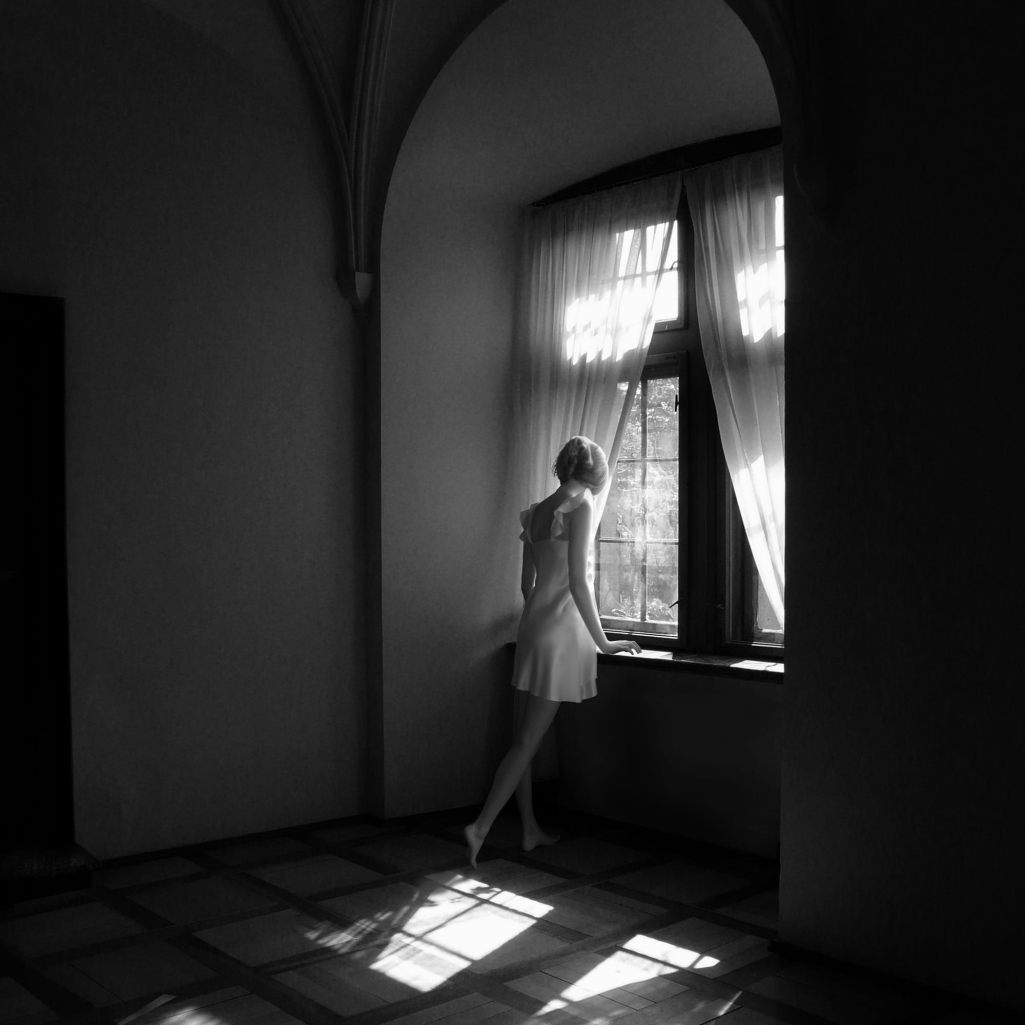- Theatre: Accidental Death of An Anarchist
- Theatre: Ein Komisches Talent
- Theatre: Gaslight®
- Theatre: Hansard
- Theatre: Home, I'm Darling
- Theatre: How to Succeed in Business...
- Theatre: I Love You, You're Perfect, Now Change
- Theatre: The Cat's Meow
- Theatre: The Crucible
- Theatre: The Duchess of Malfi
- Theatre: The Glad Game
- Theatre: The Last Noel
- Theatre: The Revlon Girl
- Theatre: Things I Know To Be True
- Theatre: Uncle Vanya
- Auditions: Audition for The Last Noel
- Auditions: Audition for Youth Theatre
- Auditions: Audition for Youth Theatre
- Auditions: Audition for The Cat's Meow
- Auditions: Audition for Things I Know To Be True
- Auditions: Audition for The Glad Game
- Auditions: Audition For Uncle Vanya
- Auditions: Audition for Hansard
- Auditions: Audition for The Duchess of Malfi
- Auditions: Audition for Accidental Death of An Anarchist
- Auditions: Audition for How To Succeed In Business...
- Lunchtime Theatre: Borne out with whalebone
- Lunchtime Theatre: Animating the Inanimate
- Lunchtime Theatre: Discussion of a local production
- Lunchtime Theatre: Lunchtime Christmas
- Lunchtime Theatre: From the theatres to the stars
- Lunchtime Theatre: Lunchtime Theatre
- Lunchtime Theatre: Lunchtime Theatre
- Lunchtime Theatre: Lunchtime Theatre
- Lunchtime Theatre: Lunchtime Theatre
- Lunchtime Theatre: Lunchtime Theatre
- Lunchtime Theatre: Lunchtime Theatre
- Open Evenings: Open Evening
- Open Evenings: Open Day
- Open Evenings: Open Day
- News: LMT at The Fringe!
- News: NANDA Awards 2025
- News: Youth Theatre Shines at NANDA Youth Fest...
- News: 2025/26 Season
- News: Under the Limelight: Backstage at the Vo...
- News: Plea for century-old theatre after drop ...
- News: 100-year-old Nottingham theatre ... laun...
- News: Lydia Marchant Came to Visit
- News: NANDA Awards 2024
- News: Discount Car Parking Offer
- News: 2024/25 Season
- News: Emmy win for our patron Matthew Macfadye...
- News: Golden Globe win for our patron Matthew ...
- News: Discount Food Offer
- News: NANDA Awards 2023
- News: 2023/24 Season
- News: Discount Car Parking Offer
- News: Lace Market Youth Theatre on the town...
- News: NANDA Awards 2022
- News: The Queen’s Award for Voluntary Service
- News: 2022/23 Season
- News: Discount Ticket Offer
- News: Covid Precautions
- News: 2021/22 Season
- News: A Virtual Vanya
- News: Nottingham Playhouse Home Grown Bursary
- News: NANDA Awards 2020
- News: Coronavirus (COVID-19): Season Cancellat...
- News: 2020/21 Season
- News: Coronavirus (COVID-19): Season Postponem...
- News: Sad and Amazingly Funny
- News: Absurd but relevant
- News: Where Are They Now?
- News: Foyer Refurbishment
- News: NANDA Awards 2019
- News: Youth Theatre win at NANDA!
- News: Hannah and Hanna on tour
- News: 2019/20 Season
- News: Adam Penford Visit
- News: The Big Wardrobe Move - Part 1
- News: Lace Market Theatre On Tour
- News: Henry, 14, shows the desire to step in a...
- News: New Wardrobe Premises
- News: Auditorium Refurbishment 2018
- News: NANDA Awards 2018
- News: Auditorium Refurbishment
- News: Remember when women were seen as 'little...
- News: Nanda Youth Festival
- News: 2018/19 Season
- News: World War II play loved by Churchill...
- News: Modern take on Charles Dickens' horror s...
- News: Oscar Wilde's An Ideal Husband at the La...
- News: Shocking true story of last woman to be ...
- News: Alan Bennett classic The History Boys to...
- News: Pride and Prejudice at the Playhouse?
- News: Launch of New Bar
- News: Is Guys and Dolls the best ever Musical?
- News: Success at NANDA
- News: LMT to Host World Premiere of New Englis...
- News: 20th Century masterpiece...
- News: 2017/18 Season
- News: Terry Pratchett's Carpe Jugulum to be pe...
- News: Comedy classic The Ladykillers will be s...
- News: West End hit that became Meryl Streep fi...
- News: Nottingham theatre kicks off 2017 with m...
- News: An alternative to panto...
- News: The Brontë sisters were chick-lit pionee...
- News: The Weirdest Title of Any Show You'll Se...
- News: Telling Tales...
- News: Love & Death
- News: Exhibition in the Studio
- News: Latest Sound Upgrades
- News: Success at NANDA
- News: Success at NANDA Youth Festival
- News: Steve Parry: A Tribute
- News: Lace Market Theatre on Tour 2016
- News: James Dean naked and 'lots of pretty lad...
- News: 2016/17 Season
- News: 2000 Facebook Likes!
- News: Art Exhibition During "Beautiful Th...
- News: Noel Coward comedy is Lace Market Theatr...
- News: Art Exhibition During "Present Laug...
- News: Discount Food Offer
- News: Art Exhibition During "The Pitmen P...
- News: New Roof!
- News: In August the Lace Market Theatre Goes D...
- News: Good Deeds Notts: A stroke of luck as Jo...
- News: Happy Jack: On Tour
- News: Success at NANDA!
- News: Nudity Features in Alan Bennett-style Co...
- News: Success at the NANDA Youth Festival
- News: Art Exhibition During "Dead Ringer&...
- News: Poltical Comedy Play is Anecdote to Gene...
- News: 2015/16 Season
- News: Bertolt Brecht Classic at Lace Market Th...
- News: Theatre preview: Bedroom Farce at Lace M...
- News: Lace Market Theatre stages the tale of a...
- News: Lace Market Theatre's One Act Play will ...
- News: It's a White Christmas at Lace Market Th...
- News: Art Exhibition During White Christmas
- News: Donation to Nottinghamshire NUM Ex and R...
- News: Lace Market Theatre tackles John Godber ...
- News: Darkly funny play at Lace Market Theatre...
- News: Lace Market Theatre commemorates WWI wit...
- News: The World of Professional Theatre has Re...
- News: Private Peaceful Collection
- News: Discount Food Offer
- News: Possibly the best set ever!!! The back s...
- News: LMT's comic, contemporary vision of rura...
- News: The horror of WW1 told in Lace Market Th...
- News: Success at the NANDA Youth Festival 2014
- News: NANDA Youth Festival
- News: VisitEngland Tourism Superstar Awards 20...
- News: 1000 Facebook Likes!
- News: The Return of Open Mic Night
- News: Art Exhibition by Neil Duckmanton
- News: Online Booking Problems?
- News: White Christmas Early Bird Offer
- News: New Website!
- News: Anne Boleyn Opens to Rave Reviews
- News: Nottingham Post interview Gordon parsons
- News: Murder Mystery Night is Big Success
- News: Nottingham Post interview Graeme Jenning...
- News: RSC Open Stages
- News: Nottingham Post Interviews Max Bromley
- News: Discount Food Offer
- News: Costume Commissioned by the Courtald Gal...
By Harriet Lane adapted by Lucinda Coxon
Alys, Always is a superbly disquieting psychological thriller, with a mischievous satirical undercurrent.
Frances Thorpe leads a mundane life as an over-worked and underappreciated sub-editor on the book’s pages of a Sunday paper, until the day she happens upon the aftermath of a car crash and hears the last words of the driver, Alys Kyte.
When Alys’s family makes contact in an attempt to find closure, Frances is given a tantalising glimpse of a very different world: one of privilege and possibility. The relationships she builds with the Kytes will have an impact on her own life, both professionally and personally.
Contains some strong language. This play explores themes of manipulation.
This amateur production is presented by arrangement with Nick Hern Books.

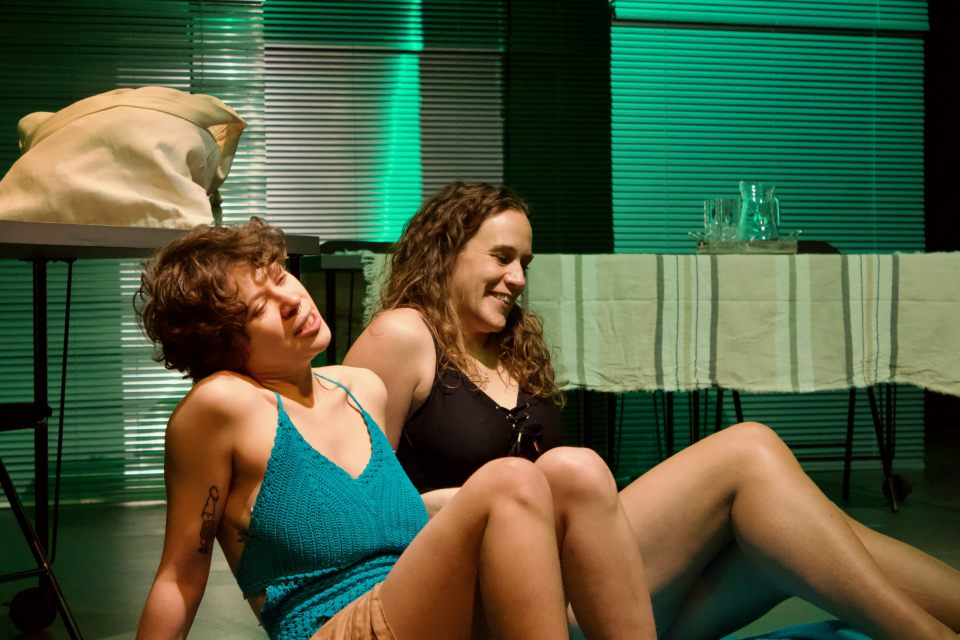
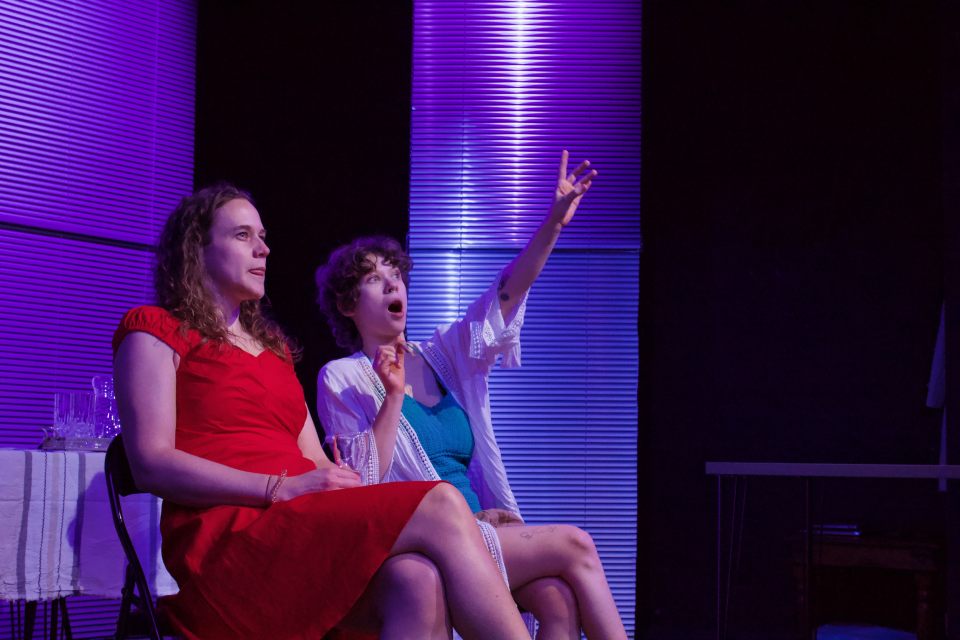

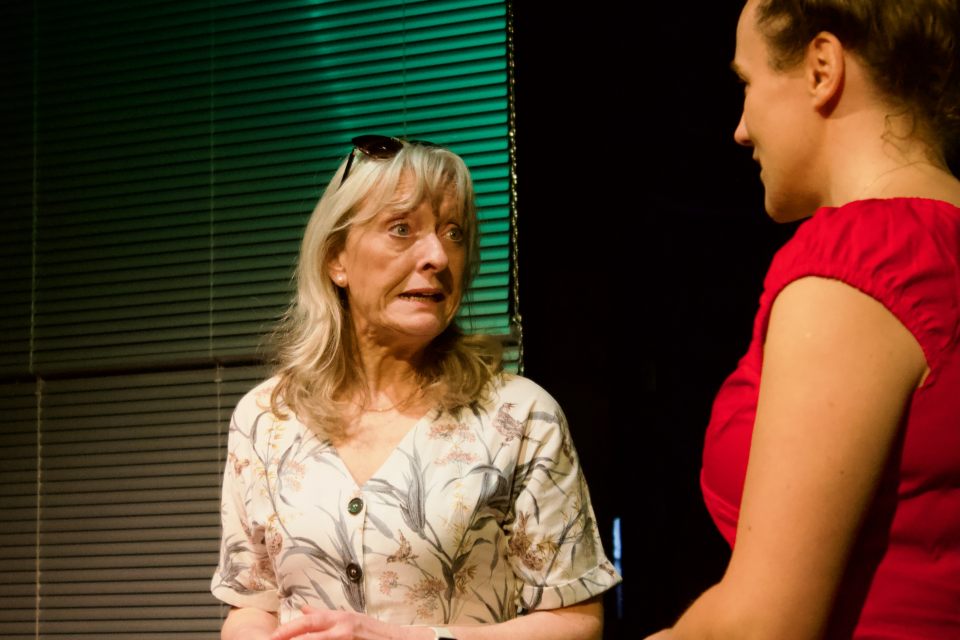
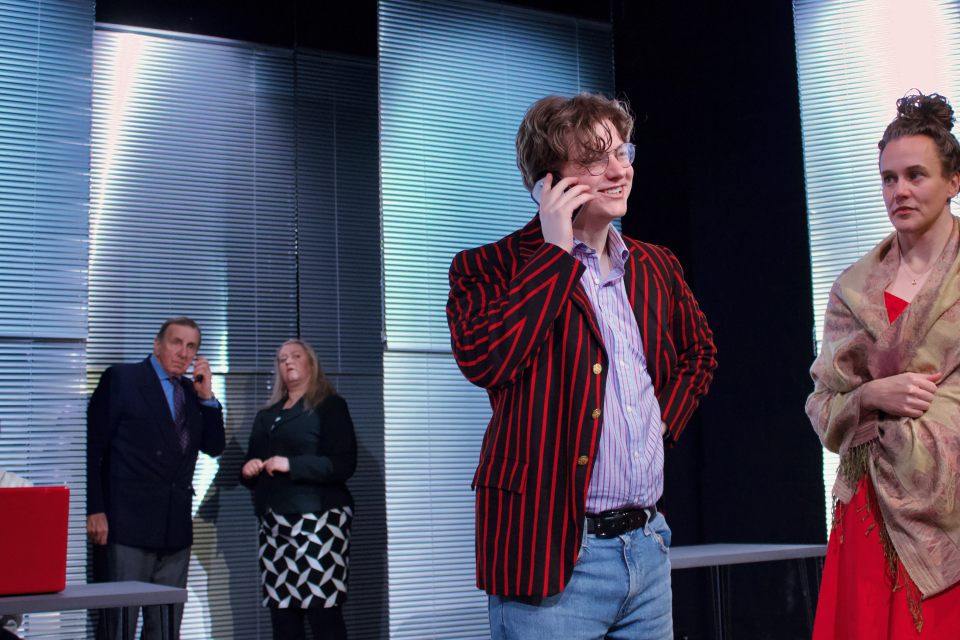
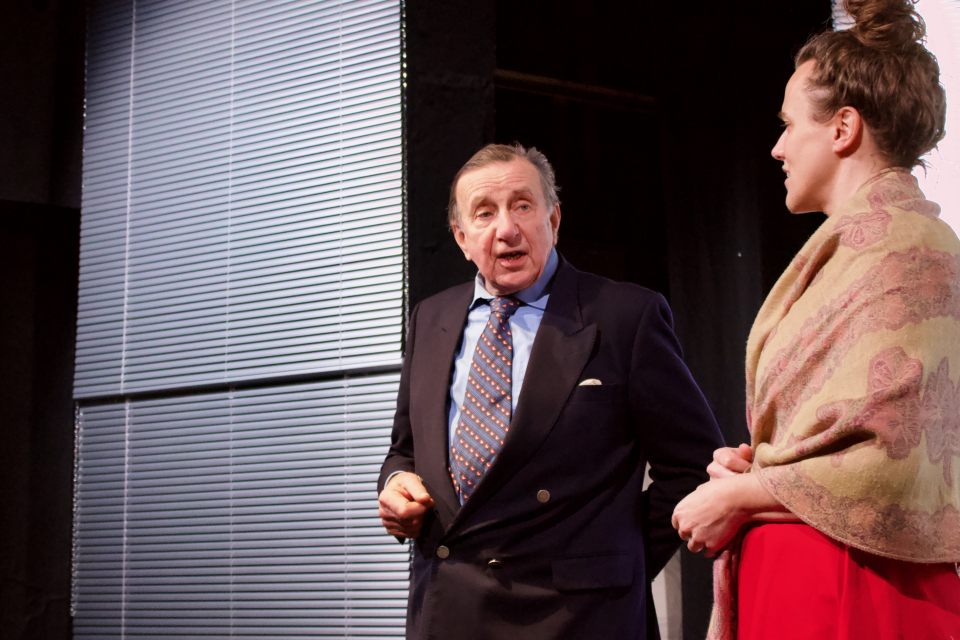
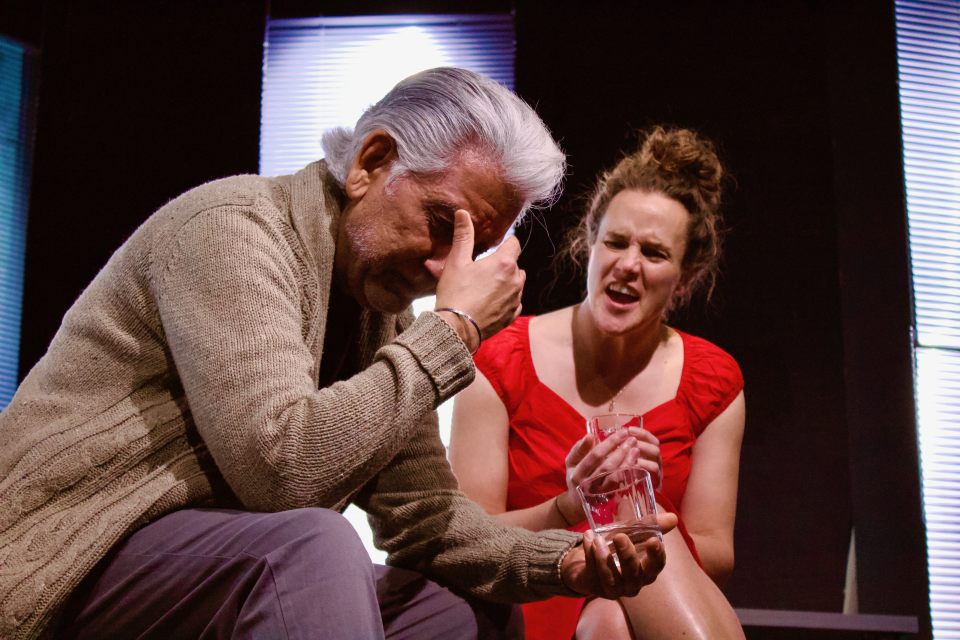
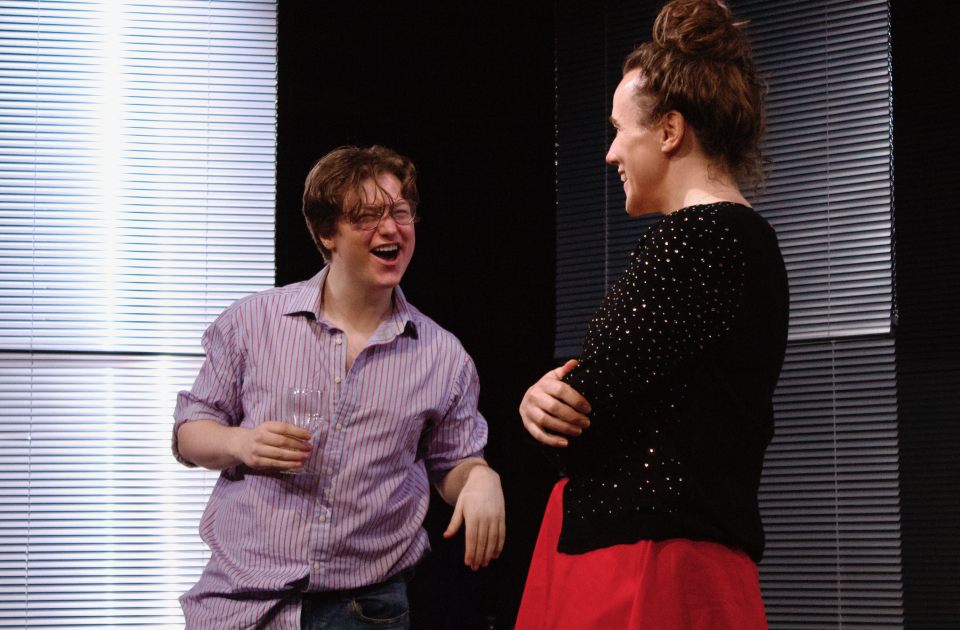
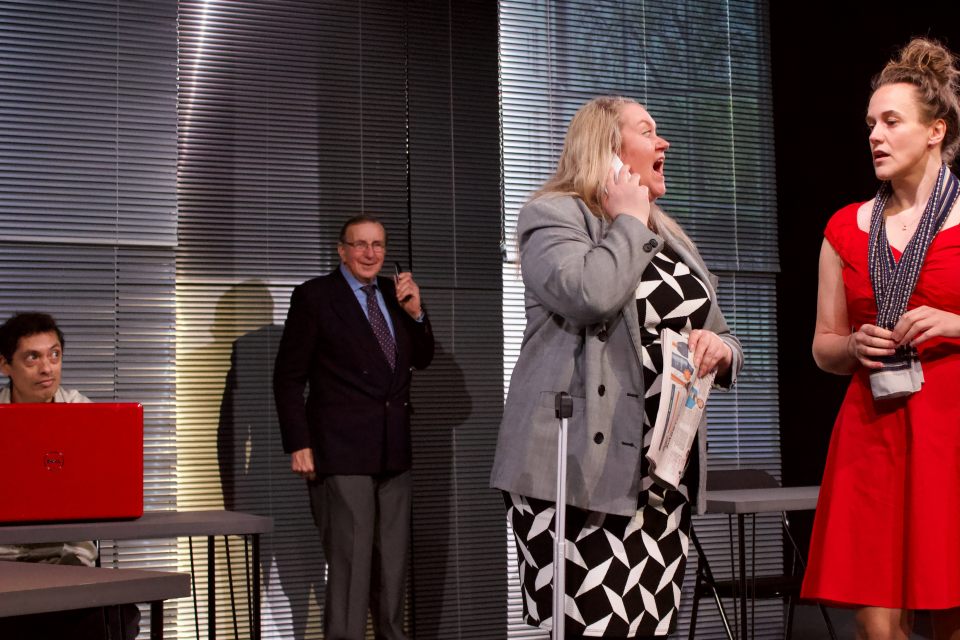
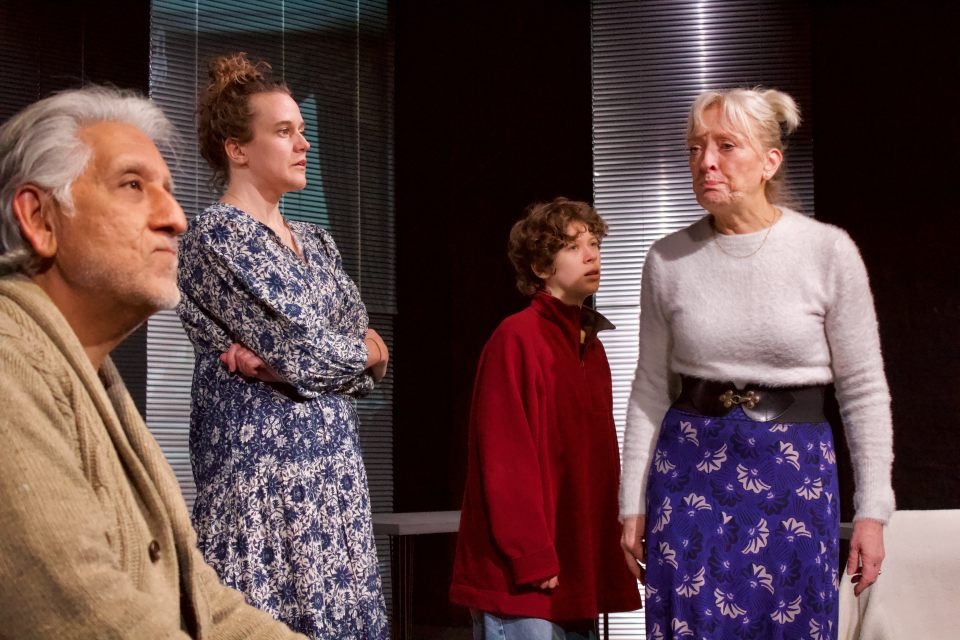
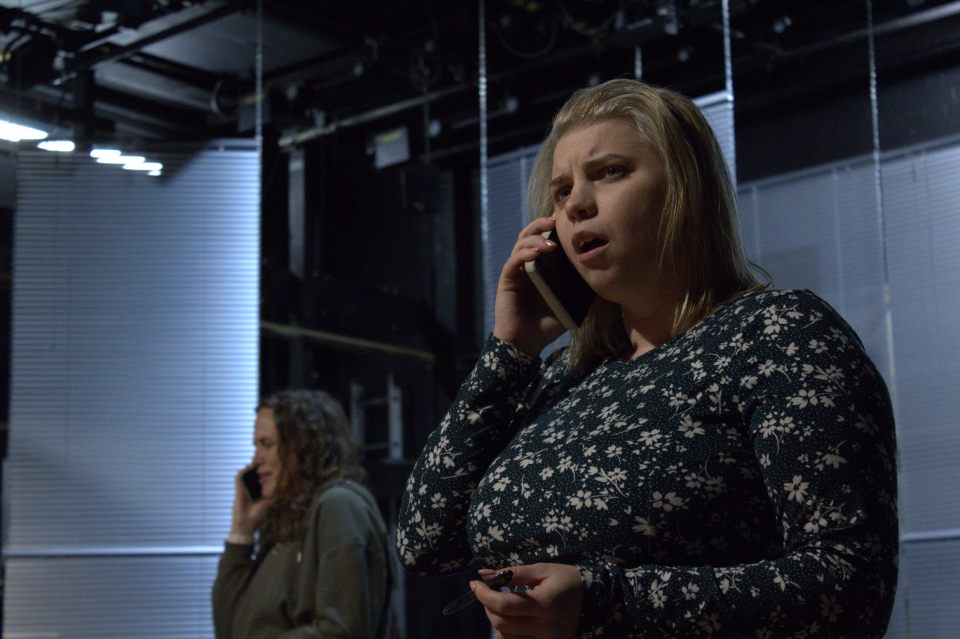
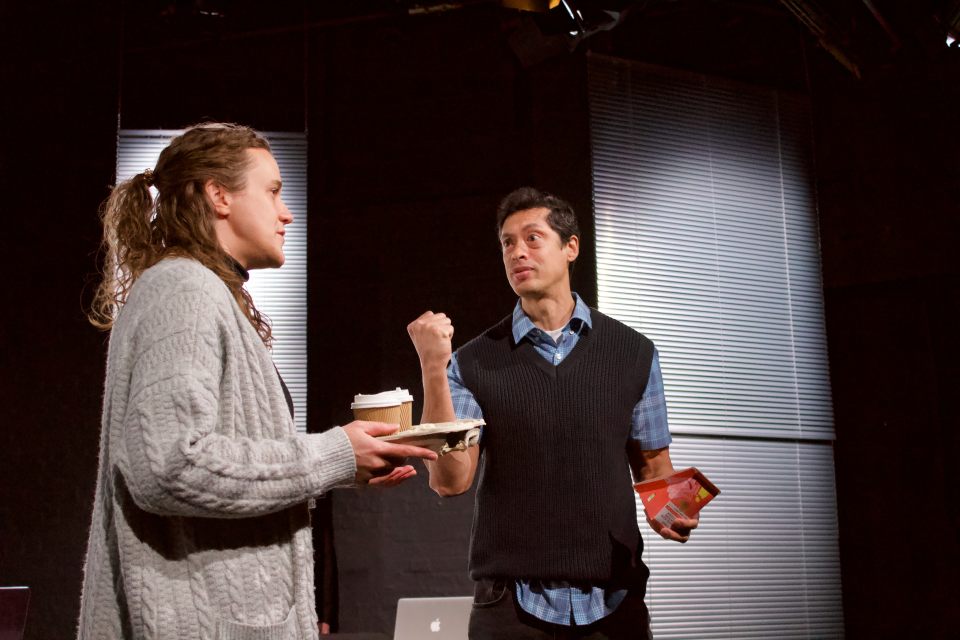

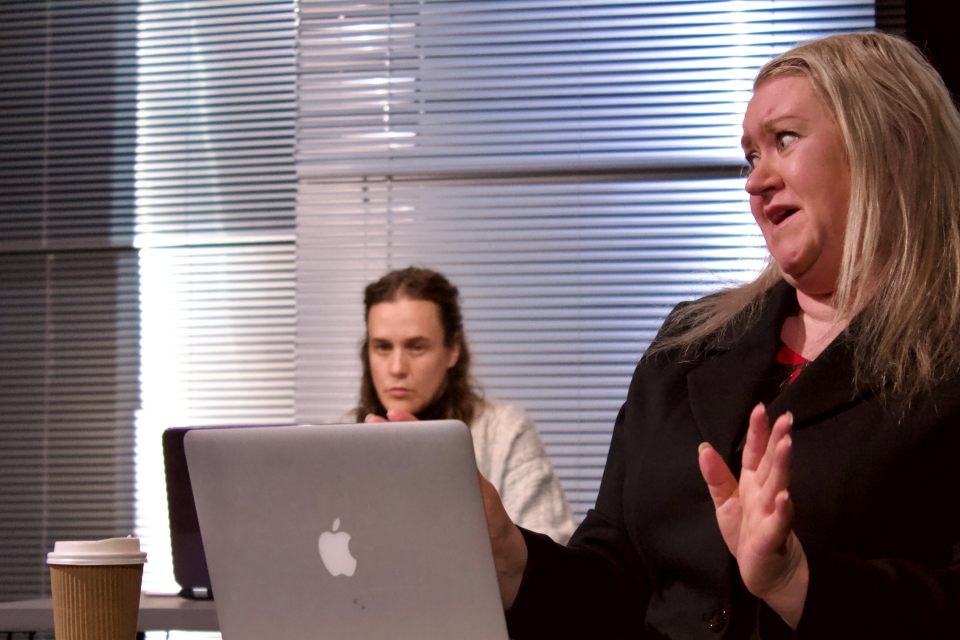
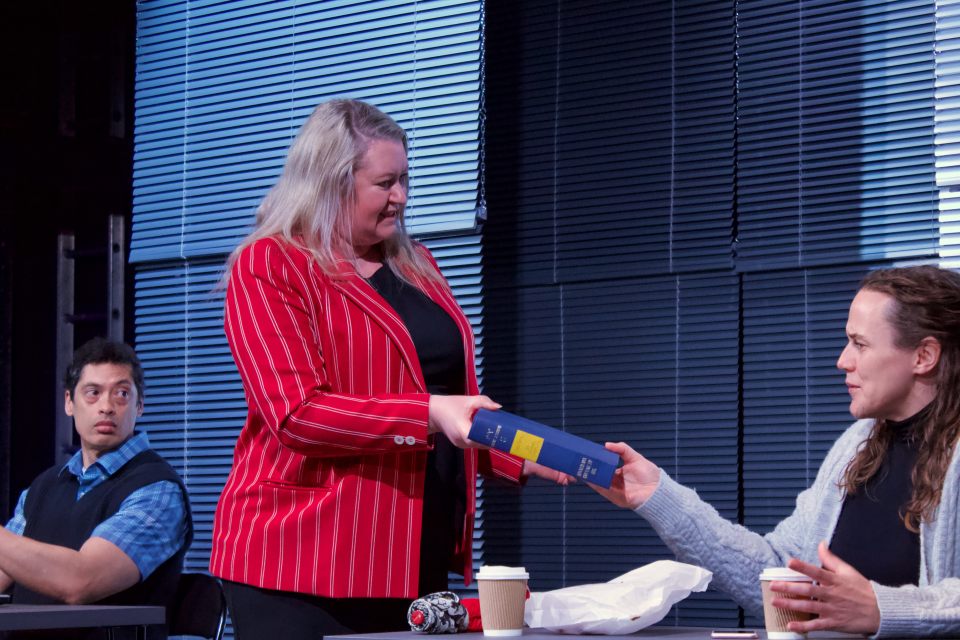
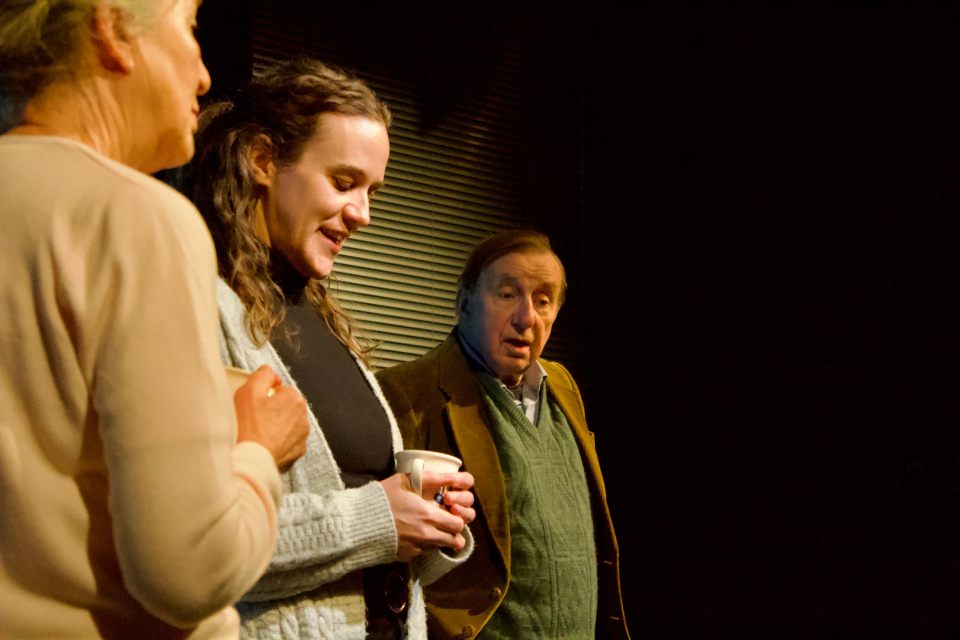

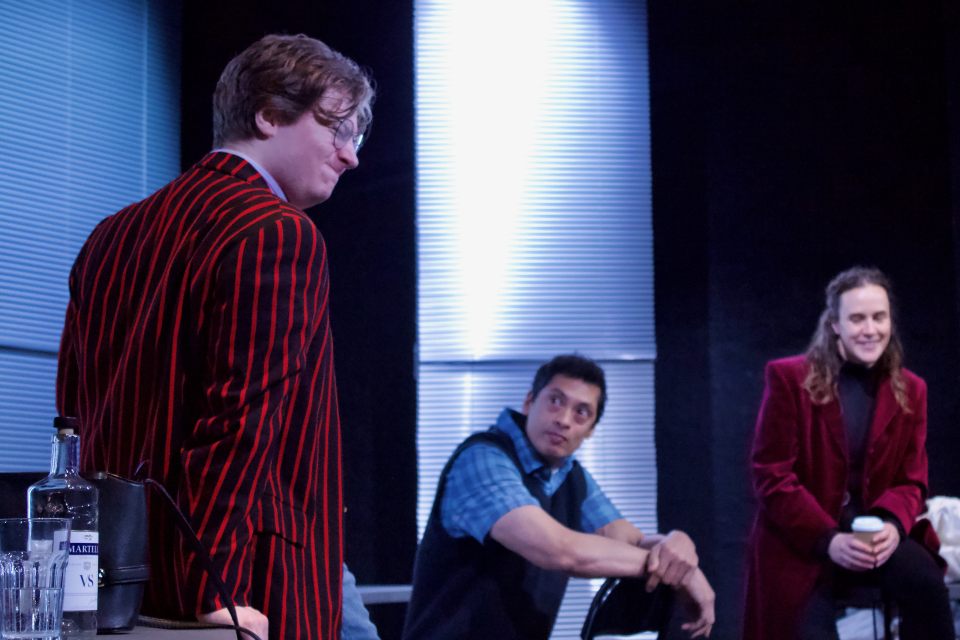
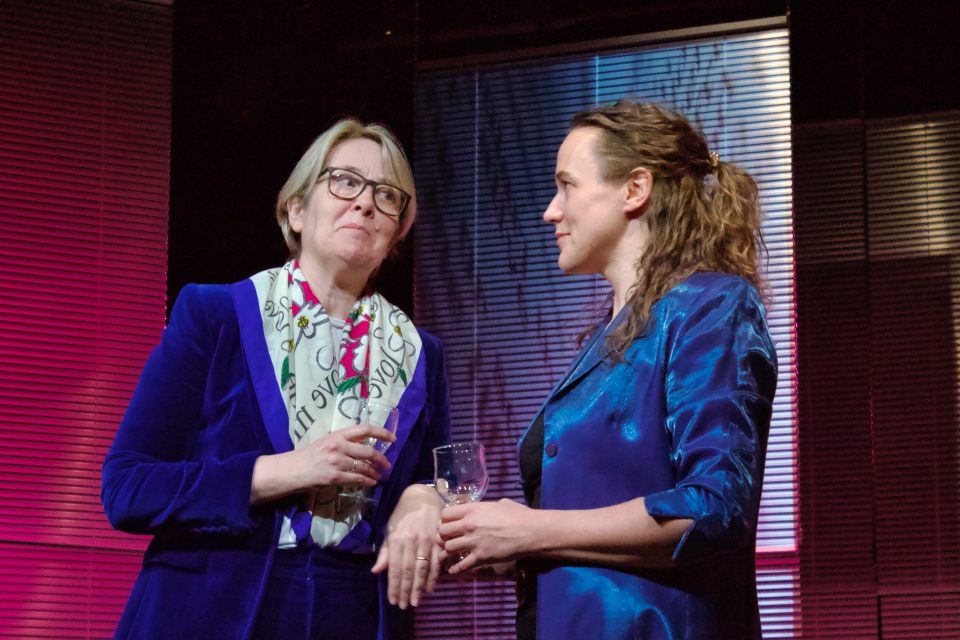
CAST
PC Tina Nagra / Guest / Waitress
Charlotte Hukin
Audrey Cullum
Emma Rayner
Mrs Thorpe
Jane Pyke
Frances Thorpe
Clare Moss
Alys Kyte / Chalotte Black
Melanie Hamilton
Oliver Culpepper
Charlie Harris
Sid
Wagner Rulli
Mary Pym
Michelle Smith
Polly Kyte
Millie Rushworth
Teddy Kyte
Ollie Ennis
Mr Thorpe
Bernard Whelan
Laurence Kyte
Gurmej Virk
Receptionist / Guest / Waitress
Evangelia Angelinou
There are no items to display
Review: Alys, Always. Lace Market Theatre. Nottingham.
The Lace Market Theatre’s production of "Alys, Always”, based on the novel by Harriet Lane and adapted for the stage by Lucinda Coxon, is ambitious in its scale, telling a story that takes place across an entire year, and beginning with a car accident, in which the titular Alys Kyte loses her life. Alys is represented as a disembodied voice, and the accident is portrayed thanks to clever use of sound effects (from sound designer Simon Carter) and sweeping lights (from lighting designer Allan Green). From hereon, the play becomes much more naturalistic, but this is an exciting start to what becomes a tense and gripping story.
The story focuses on Frances (Clare Moss), a book reviewer for a national newspaper who witnesses the accident and sits with Alys as she dies. Frances is noticeably shaken up by this event, and Moss does a great job of portraying a career-driven woman struggling to hold it together. When the police put her in touch with Alys’s family, she initially declines the invitation, wanting nothing more than to move on – but then, when she realises who the family is, she agrees to meet with them, and her motivations become a little more sinister.
Enter the Kytes: Alys’s widowed husband Laurence (Gurmej Virk) and her two grown-up children Polly (Millie Rushworth) and Teddy (Ollie Ennis). Laurence is a novelist, and Frances immediately senses an opportunity here, becoming more and more involved with the family as the play continues. Rushworth’s Polly is initially at risk of coming across as your classic posh-girl-from-a-rich-family caricature, but later scenes reveal extra depths to the character, as Polly struggles to deal with her grief. Her friendship with Frances is a lot of fun, made even more interesting by the knowledge that there is more driving Frances than just a desire to be a nice person. Ennis is given little to do in the first half, but makes a big impression nonetheless, his abrupt outbursts hinting that there is more to come. Indeed there is – and a scene in the second half allows Ennis to show off his acting chops as Teddy finally confronts Frances.
Virk’s performance as Laurence lends some gravitas to proceedings – his character is self-assured, smooth and smarmy. This is an effortless performance by Virk, who begins the play as a broken man, trying desperately to keep his family together, and becomes ever more unlikeable in the second act as his true colours are revealed.
There are plenty of moments of humour throughout, particularly in the scenes set at the newspaper office, between Frances’s colleagues Oliver (Charlie Harris), Sid (Wagner Rulli) and Mary (Michelle Smith). For anyone working in the corporate world, these scenes are sure to strike a chord, with plenty of snide comments about hot-desking, and a sense of friendly competition with an underlying nastiness. These scenes are very enjoyable, and the cast all do an excellent job in portraying your classic office bitchiness, but they do begin to feel a little repetitive at times.
The set design from Guy Evans is a marvel, featuring metallic Venetian blinds that not only give the sense of a high-end office block, but also hark back to the secrets and lies that underlie the plot. They are also used as screens for various projections which provide naturalistic backdrops or something more representative (a scene in a bar is represented by a projection of an oversized glass of beer, for example). I have never seen a set like this before, and was very impressed by the simple-yet-effective nature of it. For a play with so many scenes, set in so many locations, this was an incredibly clever solution.
The play is filled with many supporting characters – Jane Pyke and Bernard Whelan in particular are criminally underused as Frances’s parents, and Melanie Hamilton puts in a stellar performance as the Kyte’s family friend Charlotte, although one can’t help but wish we’d seen a little more animosity between her and Frances.
When the lights come up at the end of this play, the audience are sure to be left with more questions than answers. What were Frances’s motivations, and what did she actually want to achieve? Moss’s asides to the audience allow us a brief glimpse into the character, but it feels like there is still more to be uncovered. The first act is a little meandering, and at the interval I was left completely unsure as to where the plot was going to go. The second act ramps up the tension nicely, and the play seems to be building to a dramatic climax, but never quite reaches it – Coxon’s script ends without a suitable resolution, and any promises of either Frances or Laurence getting a much-deserved comeuppance are not satisfyingly delivered.
Nonetheless, this is a production that will keep you interested, with characters and stories that are easy to become invested in. At almost two-and-a-half hours, this is a long play that passes quickly, making for an enjoyable evening of theatre by one of Nottingham’s finest amateur companies.
Read the original article here.
"Alys, Always" by Harriet Lane, adapted by Lucinda Coxon
Nottingham Lace Market Theatre
Frances Thorpe works on the literary pages of a Sunday newspaper. She's quiet and capable and nobody really takes much notice of her, but is in need of most of the office staff as a dogsbody: the sort of person who is always on the outside, looking in.
One evening, driving back to London, she comes across an overturned car on the side of the road; a car that had only just pulled out in front of her on the icy road. She waits with the injured driver, Alys Kyte, until the ambulance arrives. Later, when Alys's family, who are quite well known in literary circles, gets in touch, Frances finds herself ushered for the first time into the world on the other side of the window. And she begins to wonder: what will it take to belong on this side of the fence?
Charlotte Hukin plays PC Tina Nagra, a Guest at Alys' memorial, as well as a Waitress. I know that Charlotte has an ear for accents, and while two of these roles are silent, it was nice to hear another accent in Charlotte's accent armoury for the Police Officer who attended the accident, and also followed up on the incident.
Melanie Hamilton plays Alys Kyte - well we hear Alys voice as she lies dying in the car wreck - and also Charlotte Black on stage. Charlotte is a close family friend of the Kyte’s and Laurence’s agent. One of those warm and caring characters.
Jane Pyke is Mrs Thorpe, Frances's mother, who pops up on a couple of occasions when Frances visits the family home. Jane portrays the conventional "mother" character well, making us believe that this character is in her sixties with gentle physicality and image.
Bernard Whelan plays Mr Thorpe, Frances's father and a good match for the mother figure. Mr Thorpe is a kindly and conservative character.
Clare Moss takes the main role as Frances Thorpe. This is such a wonderful character because there's such an arc in Frances's character throughout the play. Frances also becomes the narrator. You can tell by watching the way that Clare addresses the audience with her looks and the way that certain parts of the script are delivered what Frances's intentions are when she sees chinks in the Kyte armour, or is that amour? You feel Frances's strength in character grow as she sees greener grass, and knows how to get to that grass. Her social climbing also means getting respect from her boss, which also means that her career is on an upturn!
Emma Rayner plays Audrey Cullum, one of those brash journalists, which goes to show what a talented actor Emma is as the role is in complete contrast to how Emma is away from the stage!
Michelle Smith plays Mary Pym. and what a brilliant character this is. Pym is the Book Editor on the paper and is also Frances's boss. She gives all of those jobs that no one else wants to do, like feeding parking meters, going on drinks runs, arranging for things to be dispatched here, there and everywhere. You know the sort; loud, forthright, formidable and completely caustic. Michelle is wonderful in this role, and then comes that turning point when she realises that her office dogsbody may have connections that could bump Pym up the newspaper's professional ladder. But karma is something else isn't it?
Charlie Harris plays Oliver Culpepper, the Deputy Books Editor and another wonderful character who works on the newspaper. Culpepper is that character that can be found in most offices; the one that you can't stand. Loud, extrovert, lazy, displays an oily charm and I expect is a dream character role to play. A new face to me (I think) and a very welcome addition to local stages if this standard of character role playing is what we can expect from Charlie.
Wagner Rulli is Sid, another office work colleague who seems to have a bit of a thing for Frances; an attraction that is not reciprocated by Frances. Yet another new face - this production has plenty of newbies on show - who I hope will be seen in other productions by the Lace Market Theatre, and maybe other local groups.
Evangelia Angelinou, like Charlotte has three roles to play in "Alys Always", a Receptionist, a Guest and a Waitress.
Millie Rushworth, who is another new face at the Lace Market theatre, plays Polly Kyte, Alys and Laurence's daughter. What a role to play, and I very much doubt that this is Millie's first rodeo on stage. Polly is a drama student, insecure, fragile, shallow and likes a drink. She attaches herself to Frances and becomes the main inroad for Frances to utilise her entry into this renowned family. There's a lot of anger attached to this character which Millie has no issues with projecting that insecure anger.
Ollie Ennis plays Teddy Kyte, brother to Polly who also seems to have anger issues, especially with Frances being around so much. He's really suspicious of the reason for Frances being around and, after doing some digging around, finds out that Frances may have an ulterior motive for her inclusion into the Kyte family circle. Ollie does menacing really well and you can envisage leading man roles somewhere in the future, especially if there's an element of sly, bad guy character up for grabs.
Gurmej Virk is Laurence Kyte, famous novelist who has now lost his wife in the car accident. he is rich and owns several properties, but from the first scene we discover that, from Alys' comments about Christmas, things at home were not so rosy. Why could that be? Gurmej is one of the recognisable faces in this cast, having seen him last year in the wonderful "Once On This Bridge", so straight away I knew the quality of his character acting, which did not disappoint. At first sight, Laurence puts on a good show of his grief, but there's a scene in this play where you suddenly have doubts on Kyte's character!
Director Helen Sharp has another success on her hands with this production and cast. What I really enjoyed was that, via Millie and Ollie, they had the space and time to show the way that being the children of a well known figure, Polly and Teddy became instantly flawed. Little hints like the items that Frances found in Teddy's bedroom, while she was having a noisy round, and the clinginess and addiction to alcohol for Polly gave us incites on the Kyte kids. The pace was well observed as well to give the audience time to take in all the characters' foibles. There are two sections of intimacy that are not physically seen on stage but are intimated at, and you get those scenes without anything being spelt out to you.
Set Designer Guy Evans has created a very stylish set with eighteen (or there may have been sixteen) large sets of silver blinds which creates reflective flats of light but also brings a stylish cleanliness to the set. Props, in the way of chairs that can be simply covered by blankets, automatically become settees and then back to office chairs.
Lighting Designer Allan Green uses the reflective silver blinds to create colour on stage, bringing warmth to the stage and set, and when not using the silver blinds, you get that feeling of sterility of the office environment. Clever use of blue and red lighting for the arrival of the ambulance, plus various scenes when the set needs to be flooded with colour.
Sound Designer Simon Carter gives a masterclass in effects and soundbites. Everything from ambulance sirens, recorded announcements, the voice of Alys from the car, which needed specific timing to respond to Frances's call and respond scene, the Christmas party scene and several other scenes that require effects and sound. And the use of music from Teddy Swims brings the play right up to date.
Projection Designer Matthew Allcock also uses the blinds to screen the scene settings, which move the various scenes from one section of the play to the next. Images of flower gardens, bookcases, rain-soaked windows all place you at the required area of the story in a stylish and modern method of transporting an audience without ever leaving your seat.
I had never heard of this play before but what a stylish, and at times quite unsettling piece of theatre. It's also a warning to appreciate the people that you work with, because you never know what the future may hold. You may be sat next to a self-assured and cunning sociopath and not realise until it's too late!
Read the original article here.

